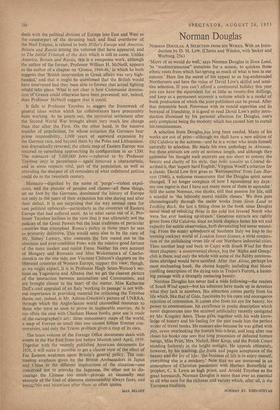Norman Douglas
'MANY of us would do well,' says Norman Douglas in Siren Land, 'to "mediterraneanise" ourselves for a season, to quicken those ethnic roots from which has sprung so much of what is best in our natures.' Here lies the secret of his appeal to us fog-enshrouded Northerners and here the value of David Low's skilful and sensi- tive selection. If you can't afford a continental holiday this year you can have the equivalent for as little as twenty-five shillings, and keep as a permanent souvenir a volume which is a model of book production of which the joint publishers can be proud. After that detestable book Pinorman with its rancid asperities and its betrayal of friendship, it is good to read David Low's pithy intro- duction illumined by his personal affection for Douglas, one's only complaint being the modesty which has caused him to curtail his reminiscences.
A selection from Douglas has long been needed. Many of his works are out of print—although we shall have a new edition of Old Calabria in the autumn—and he is a writer who lends himself naturally to selection. He made his own anthology in Almanac, but these extracts are only of sentence length, and although they epitomise his thought such excerpts are too short to convey the beauty and clarity of his style, that belle tonalite, as Conrad de- scribed it, that 'superb hard English,' Virginia Woolf's criterion for a classic. David Low first gives us 'Retrospective' from Late Har- vest (1946), a welcome reassurance that the Douglas spirit never changed. 'I no longer complain of how I squandered my days :' my one regret is that I have not many more of them to squander.' Still the same Norman, one thinks, still that passion for life, still a scandal to 'the biliously moral middle classes.' We then pass chronologically through the major works from Siren Land to Looking Back, the last a fitting close to the book since Douglas never tired of rebuking those in the cold but fevered North who were 'for ever looking up-stream.' Generous extracts are rightly given from Old Calabria, since no book displays better his wit and capacity for satiric observation, both devastating but never wound- ing. From the sunny splendours of Southern Italy we leap to the teeming cockney world of London Street Games, a vivid conjura- tion of the pullulating street life of our Northern industrial cities. Then another leap and back to Capri with South Wind for three short chapters: a controversial choice, but the 'Alpha and Omega' club is there, and only the whole with some of the flabby conversa- tions abridged would have satisfied. After that Alone, perhaps his most enchanting book, the choice happily including that blood- curdling description of the dying cats in Trajan's Forum, a haunt- ing passage with a strangely menacing beauty.
Norman Douglas has never had a wide following—the readers of South Wind apart—but his admirers have made up in devotion what they lack in numbers. His attraction comes partly, from his life which, like that of Gide, fascinates by his open and courageous rejection of convention. It comes also from his eye for beauty, his power to communicate, his excellence in poetic description which never degenerates into the strained artificiality recently castigated by Mr. Kingsley Amis. These gifts, together with his wide know- ledge of history and his feeling for the past made him the perfect writer of travel books. He endears also because he was gifted with pity, never overlooking the human bric-a-brac, and long after one closes his books one sees that long procession of defeated human beings, Miss Prim, Mrs. Nichol, Herr Krup, and the Polish Count standing forlornly in the bright sunlight. He appeals ultimately, however, by his teaching, the frank and pagan acceptance of the beauty and the joy of life : 'the business of life is to enjoy oneself, everything else is a mockery.' Now that we are immersed in an atmosphere of Christian pessimism with Herbert Butterfield as prophet, C. S. Lewis as high priest, and Arnold Toynbee as the great heresiarch, Norman Douglas is more than ever an essential to all who care for the richness and variety which, after all, is the European tradition.
NORMAN ST. JOHN-STEVAS


































 Previous page
Previous page